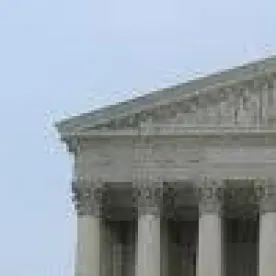Yesterday marked the first day of the United States Supreme Court’s new term, and the first case heard (Epic Systems Corp. v. Lewis) was one of interest to employers around the country. In several cases consolidated before the Court on appeal, the National Labor Relations Board (“NLRB”) found employer arbitration agreements that included waivers of an employee’s right to bring a legal claim as part of a class or collective action are invalid under the National Labor Relations Act (“NLRA”).
As you may recall from our past posts (here, here, here, here, and here), the NLRB has asserted that class action waivers are illegal because, it purports, litigating collectively constitutes concerted activity under the NLRA, and thus must be protected from employer interference. Many of these waivers can be found in employment arbitration agreements, setting up a conflict between the NLRB’s interpretation of the NLRA and the Federal Arbitration Act (“FAA”), a federal statute that favors enforcement of arbitration agreements, even where employment claims are at issue. Although employers have argued that the FAA compels enforcement of class and collective action waivers in arbitration agreements, the NLRB has argued that class action waivers should fall under an exception to the FAA that allows courts to invalidate illegal arbitration agreement provisions.
The Supreme Court agreed to hear the matter and resolve a split among the federal Circuit Courts of Appeals on this issue. When the parties convened Monday morning, the Court showed an expected divide as it questioned each side. Justices Ginsburg and Kagan grilled legal counsel for the employers on how they could prevail without “undermining and changing radically” the NLRA’s protection of employee rights to act concertedly to improve the terms and conditions of their employment. Although counsel for the employers argued that the NLRA only protects employees’ actions in the workplace and not in the courthouse, Ginsburg and Kagan expressed skepticism, suggesting that concerted activity is protected regardless of forum “as long as the ultimate goals [are] workplace-related.” In support of the employers’ position, the United States Department of Justice argued amicus curiae (technically, “friend of the court”; intervening parties who request to be heard on issues in which they have an interest or could be of assistance to the Court). Counsel for the United States argued the right to proceed in court or arbitration as a class or collective group exists not by virtue of the NLRA, but rather, by other procedural litigation laws, such as Rule 23 of the Federal Rules of Civil Procedure, which do allow for waiver of these class or collective procedures. Counsel for the United States further asserted that the NLRB overstepped the boundaries of its authority by trying to characterize these procedures as incontrovertible, substantive rights under the NLRA.
Justice Kennedy questioned the NLRB’s counsel whether the arbitration agreements at issue truly prohibit employees’ right to engage in concerted activity, noting that employees could still work together to obtain the same counsel, share information, and strategize about their cases; they were merely prohibited from joining their cases and litigating collectively. Counsel for the NLRB confirmed its position that the NLRA affirmatively protects the class action procedure as a substantive right.
Although not all of the Justices questioned the parties during arguments, those that did split along expected lines. Supreme Court authorities generally predict a 5-4 decision in favor of class waivers, however, the outcome may not be that simple. At issue in this group of cases were class action waivers contained in arbitration agreements, creating an “FAA versus NLRA” supremacy challenge. One potential outcome is that the Court could resolve the sole question of whether the FAA requires that waivers be enforced as written, but leave open the question of whether stand-alone class action waivers are valid. It is unclear whether the Supreme Court will address the overarching issue of whether litigating as a class is a procedural right, deemed waivable under the legal provisions that create them (such as Rule 23 or under specific substantive laws), or substantive, unwaivable rights. If the Court rules against class action waivers, employers will need to review and revise any agreements containing them. If the Court upholds class and collective action waivers, employers would be advised to consider implementing such tools with their workforce. We will update you when the Supreme Court issues its opinion, and provide further guidance at that time.




 />i
/>i
